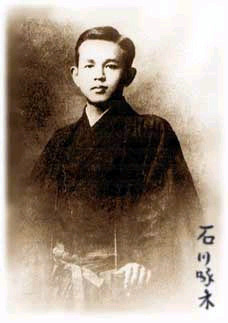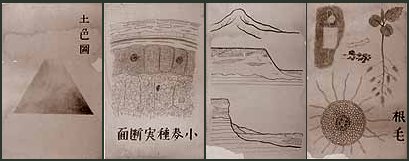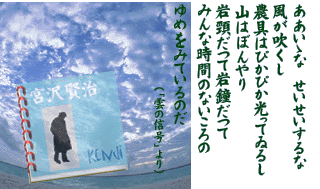Miyazawa Kenji – Ishikawa Takuboku – Two Japanese poets from Iwate
Ishikawa Takuboku 
Roma-ji diary translated by Donald Keene
A Spoonful of Cocoa
I know
The sad heart of the terrorist-
A single-minded heart
Which finds it impossible to cut asunder speech and act,
A heart that wants to speak with deeds
Instead of words, which one has been deprived of,
A heart that hurls at the foe the body encasing it-
This is the sorrow serious and fervent men forever have.
Sipping cold cocoa from a spoon
After some eternal endless debate,
I know from this slightly bitter taste
The sad sad heart
Of the terrorist.
(Poem received from Hal – via email. This poem from a series of poems called The Whistle and Whistling–yobuko to kuchibue around 1911 very influenced by russian socialist, was ill at the time of poem)
Matt who lives in Japan blogged about the above poem, here.
Two renowned and beloved Japanese poets came from the same region Iwate ken.
Both born poor, excelled in school and suffered illness, one died at the age of 26, another at 37. In spite of their humble origin, both received excellent education, learned English, played music. Takuboku read Gorky and Ibsen and tried his translation of Ibsen’s work.
Takuboku according to Donald Keene was an enfant terrible who wasted his extraordinary gift. Although the western word “Terrorist” appeared in katakana in his poem, he was an apolitical poet, who was isolated, anti-social and prone to unhealthy dose of introspection and self-loathing.
Miyazawa went to the same school and followed in Takuboku’s footsteps to become a poet. But unlike self-involved Takuboku, Miyazawa cultivated a life as a thinker, a practicing buddhist, a geologist/agronomist, and idealsitic educator and reformer.
Kenji Miyazawa was born on Aug 27, 1896. Today he is known mostly for writing children’s stories.
“In the introduction to his collection of short stories, The Restaurant of Many Orders, he set himself up as an experimental medium for the chaotic processes of natural phenomena. He saw himself as a simple vehicle for reprocessing nature itself. “These stories of mine,” he wrote in 1923, “all came to me from moonlight and rainbows, at places like railroad tracks and fields and forests.”
Kenji Miyazawa, Rebel with a Cause (collection of essays)
From Who is Kenji?
Kame neko (oven cat- a sample story by Kenji Miyazawa)
All about Kenji – (more formal page from Hanamaki city)
VISIONS OF IHATOV: KENJI’s SPRING, read here.
(Kenji’s influence on the Japanese Anime culture.)
 (image source)
(image source)
Drawings by a buddhist/poet/geologist/agronomist/socialist
